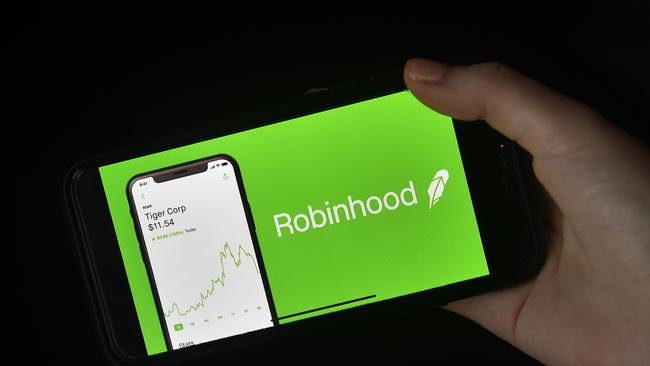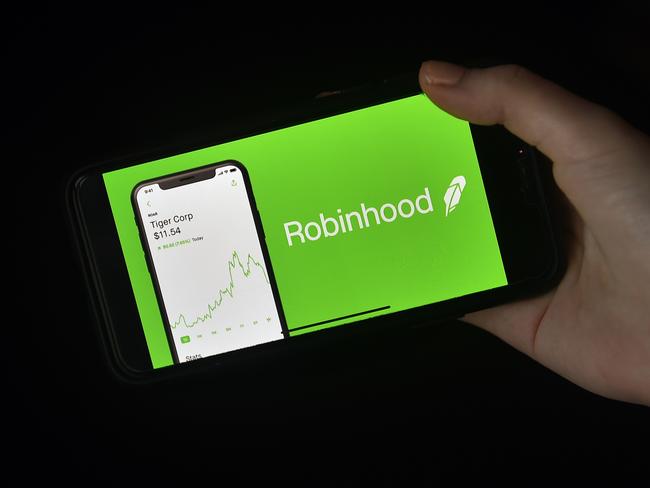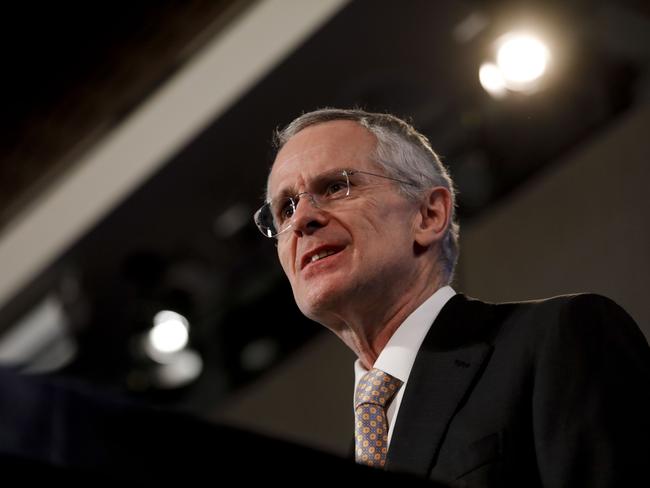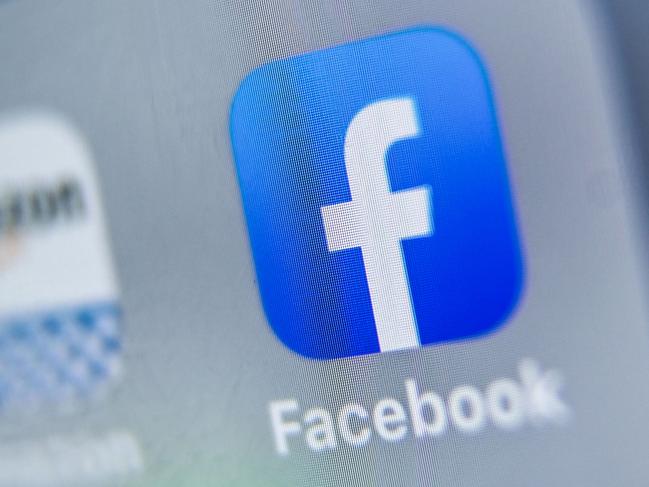Robinhood raises another $2.4bn from shareholders
In the last week, the company has raised more money than it had in its entire existence.

Hello and welcome to The Download, The Australian’s technology blog for the latest tech news.
1.30pm: Robinhood raises another $US2.4bn from shareholders
Robinhood Markets raised another $US2.4 billion from shareholders, days after investors agreed to pump $1 billion into the online brokerage to help it ride out a trading frenzy in talked-up stocks like GameStop Inc.
The big infusion—the $3.4 billion brought in since last Thursday is more than the company had previously raised in the eight years since its launch—gives Robinhood a cushion to cover a surge in collateral requirements stemming from the trading boom. The cash should also allow the company to remove many of the trading restrictions that angered customers of the popular brokerage, people familiar with the matter said.
The fundraising caps off the most tumultuous period since Robinhood’s founding. The brokerage, with its free trades, easy-to-use app and digital confetti, soared in popularity when Americans stuck at home during the pandemic rediscovered the stock market.

But the same forces that propelled Robinhood’s growth became a liability last week, when amateur investors—captivated by gains that other traders flaunted on online forums like Reddit’s WallStreetBets—flooded it with orders to buy and sell a handful of beaten-down stocks.
Robinhood built out features in its app with Silicon Valley-style growth in mind, but last week showed it wasn’t prepared to go viral. Wild price swings in a number of stocks prompted the clearinghouse that processes and settles its trades to ask Robinhood for more cash to cover potential losses on the transactions.
Because of a lag between when investors book new positions in a stock and when their cash is actually exchanged for securities, brokerages like Robinhood have to maintain deposit accounts at the clearinghouses that help finalize trades. The Depository Trust & Clearing Corp., which operates the main clearinghouse for U.S. stock trades, requires brokerages to post more of their own money in riskier times to insure against losses.
In an interview posted online late Sunday, Robinhood Chief Executive Vlad Tenev said the clearinghouse initially asked for $3 billion to back up the trades—“about an order of magnitude more than what it typically is.”Robinhood restricted buying in more than a dozen stocks and related options on Thursday, which helped lower the amount of collateral it needed to post to $700 million.
The trading restrictions enraged many Robinhood customers, who took it as a sign that Wall Street was closing ranks. The GameStop rally had dealt painful losses to some hedge funds that had bet the retailer’s shares would fall.
Mr. Tenev pushed back on that narrative in the interview, a live stream alongside Tesla CEO Elon Musk on the invitation-only social networking app Clubhouse. Mr. Musk asked Mr. Tenev whether hedge funds had pressured the company or wielded influence at DTCC, a theory that has made the rounds on Twitter and online forums like WallStreetBets.
“I don’t have any reason to believe that,” Mr. Tenev said, “then you’re getting into conspiracy theories.”
With billions of dollars in fresh funding, Robinhood should be better-positioned to cover higher collateral requirements in the future, unless investors’ mania exceeds all expectations. New and existing Robinhood shareholders participated in the deal, which is structured as a note that conveys the option to buy additional shares at a discount later, a person familiar with the matter said.
Robinhood’s collateral requirements have fallen since Thursday, the person said, indicating that the company’s restrictions on buying some stocks dampened the overall riskiness of its customers’ trading activity. DTCC also returned a portion of the additional money Robinhood had to post on Thursday, the person said.
Robinhood has since loosened many of the buying limits put in place last week. At one point, the list of restricted stocks had swelled to more than 50. On Monday afternoon, Robinhood had buying limits on eight popular stocks, including GameStop.
The episode doesn’t appear to have dented Robinhood’s popularity. Its app was downloaded more than 600,000 times on Friday alone, according to analysts at JMP Securities. By comparison, the Robinhood app was downloaded around 140,000 times during its most active day in March 2020, when coronavirus fears sent stocks down sharply.
The Wall Street Journal
David Swan 10.30am: Canada to force tech giants to pay for news
Canada is readying legislation that would force social media companies to compensate Canadian news publishers, following Australia’s looming world-first media bargaining code, as the regulatory push expands internationally.
Canadian Heritage Minister Steven Guilbeault told his MPs of the plans last week, according to The Globe and Mail, and said that Canada was ‘looking closely’ at developments in Australia.

He’d tweeted last month that “we stand in solidarity with our Australian partners” and that “when facing the web giants, we must stand united.”
The Canadian government has reportedly not settled on whether to follow Australia’s approach, which deals with a market power imbalance with an arbitration process, or France’s path which has been to force Google to pay for news by deeming news snippets at copyrighted material.
Canada is also proposing to create a new regulator to oversee how Google and Facebook grapple with illegal content like hate speech and child pornography, reports say.
“We know there’s a problem. We’ve recognized it for some time,” Mr Guilbeault told The Globe and Mail, in relation to the news industry.
“We will table a bill in the spring.”
ACCC chair Rod Sims has previously revealed he’d been in contact with his international counterparts about Australia’s news media bargaining code.
And Scott Morrison will seek to build support from world leaders for Australia’s news media bargaining code when he meets his overseas counterparts and attends international forums this year, declaring a sustainable media landscape is vital to a functioning democracy.
“I would like to see more alignment between the world’s economies on these sorts of things (the media bargaining code),” the Prime Minister said on Monday. “We want to work (with) the companies on these sorts of things; we want a practical outcome. But the world has changed.
“Digital technology has affected that, and we’re trying to ensure that our regulatory system keeps pace with that change to ensure that journalists can do their jobs, not just in taxpayer-funded organisations but commercial ones too.”
The legislation was introduced to parliament late last year, and would force the tech giants into mediation with publishers over the value of their news, and hit them with fines of up to $10m if they fail to comply. It’s now before a Senate committee.
David Swan 9.05am: Facebook to counter Apple’s privacy update
Facebook plans to roll out an in-app prompt aimed at educating users about the handling of their data as it battles Apple over the iPhone maker’s new privacy changes that would require users’ consent to track their behaviour and make targeted ads more difficult.
The social-media company will show users a screen that includes information about its personalised advertisements. The screen will ask users for permission to use data collected from third-party websites and apps while also describing how certain data is being used, for example, to personalise their experience. The screen will be paired with an Apple prompt related to its new privacy policy, which is expected to be released in the next several months. Facebook plans to test the screen with some users beginning Monday before officially launching it when Apple’s new privacy tool rolls out.
“People deserve the additional context, and Apple has said that providing education is allowed,” Facebook said Monday. The company said agreeing to the prompt wouldn’t result in its collecting new types of data, and users who decline it would still see advertisements, albeit less relevant. Apple’s prompt will ultimately be the decisive tool over how user behaviour is tracked across apps.
Facebook and Apple have been battling for months on several fronts and have become more personal in their criticism lately.
Under Apple’s new privacy changes, which will be released in a new software update, many apps will begin asking users whether or not they want their behaviour on the web to be tracked for the purposes of personalised ads. Facebook, which relies on such tracking to power its advertisement business, has said the new rules will hurt small businesses. The update has been controversial among the broader advertisement industry, although Apple has said the changes wouldn’t prohibit tracking but would require app makers to obtain users’ permission to do so.
While talking remotely to the Consumer Privacy and Data Protection Conference last week, Apple CEO Tim Cook condemned what he called “a theory of technology” built on engagement and algorithms that help spread disinformation and conspiracy theories in order to collect user data for advertising.

Mr Cook, while not naming Facebook directly, said business built on misleading users and data exploitation “does not deserve our praise — it deserves reform.”
Mr Cook’s comments came after Facebook CEO Mark Zuckerberg criticised Apple during the company’s earnings call a day earlier and singled the company out as one of its largest competitors, saying Apple has made misleading claims about user privacy. Facebook, which expects Apple to roll out its new privacy policy during the current quarter, said it expected the changes to weigh on its advertisement performance.
The battle over app tracking is happening as Facebook continues to expand its advertisement goals while also confronting major regulatory hurdles.
The company has long targeted large advertisers to its platform and has been pushing to court small businesses to its growing Marketplace segment, which it has been integrating with its Instagram and WhatsApp apps. Revenue from the segment that includes Marketplace and the company’s virtual-reality unit increased to $US885 million in the latest quarter, more than doubling from the year-earlier period.
In December, the Federal Trade Commission and a group of 46 states each filed antitrust lawsuits against Facebook accusing the company of buying and freezing out small start-ups in order to squeeze competition. The FTC case aims to unwind the company’s purchases of WhatsApp and Instagram.
Facebook has performed well despite the threats. The company posted revenue of $US28.07 billion and profit of $US11.22 billion in the fourth quarter, both record levels. Facebook said 2.6 billion people a day used one of its platforms during the period, although the company’s daily users in the US and Canada fell for a second consecutive quarter to 195 million.
The Wall Street Journal



To join the conversation, please log in. Don't have an account? Register
Join the conversation, you are commenting as Logout